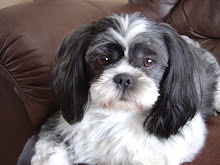
Medical Update – The vet phoned dad and said that there was no indication of deep infection and to start the steroid prescription. Since then my groin has healed and the lumps on my chin and beside my nose have started to shrink in size. Unfortunately I'm still losing weight. Dad will be taking me back to see the vet tomorrow, so hopefully he can come up with a solution to the weight loss. (This is the exact opposite of today's blog topic, which as the title says is obesity.)
An alarmingly high proportion of dogs, these days, suffer from obesity. The primary cause of this is due to over eating and lack of exercise.
Most dog owners, now-a-days, have very busy lives with many work related and social responsibilities. As a result, their dogs don't get taken for as many walks as the should. Many days their food is either left down all day, like mine, or care is not taken in measuring out the proportions recommended for the size or breed of their dog.
Some breeds are more prone to becoming obese than others. Cocker Spaniels and Labrador Retrievers are two breeds which are very susceptible to obesity. On the other hand, Terrier breeds are the least susceptible breeds to becoming obese.
If your dog shows a tendency to having a weight problem, ensure that she only eats what you give her. Do not allow other family members or well meaning neighbours to give her treats or special tidbits. Please have your dog examined by a veterinarian (vet) before considering putting her on a diet as there may be an underlying medical problem that is responsible for your pet's weight gain. As mentioned last time, in multiple dog families, you have to be vigilant that food guarding or food gorging is not taking place. This is a jealousy or psychological type problem that needs to be discussed with your vet so that you can find a safe and satisfactory solution.
The one downside to having your female dog spayed, or your male dog castrated, is that hormonal changes take place which alter their weight regulating mechanism. This means that the same amount of food after the operation may result in weight gain. If this occurs, discuss it with your vet to arrive at a sensible solution. It may be necessary to reduce the number of calories in the food provided. This may involve switching to calorie reduced food, or adding more bulk to your dog's current food to make it seem more substantial.
One method that has proved fairly successful with a number of dogs is providing them with uncooked carrots as treats instead of dog biscuits. Uncooked carrots can also be chopped up and added to your dog's regular food to provide extra bulk when the amount of food is reduced to lessen the calories consumed. As well as reducing calorie intake, these vegetables are good for aiding the teeth cleaning process. Some dogs are satisfied with the carrots just being washed and the tops and tips being removed, while others prefer to have their carrots with the tops, tips and skin removed.
Since cold winter weather increases a dog's appetite, adding bulk without increasing calories is necessary at this time of year. Where I live in northern Canada, winter is long and cold – temperatures in the minus 30 to minus 50 degree Centigrade* range, often accompanied by a wind, makes outdoor exercise impractical much of the time. As a result, reduction of calories is essential or weight gain at this time of year is inevitable.
Until next time,
Teia
* Centigrade or Celsius temperatures are scales where water freezes at 0 degrees and boils at 100 degrees – in the Fahrenheit scale, water freezes at 32 degrees and boils at 212 degrees. At minus 40 degrees, all three scales are in synchronization.

No comments:
Post a Comment